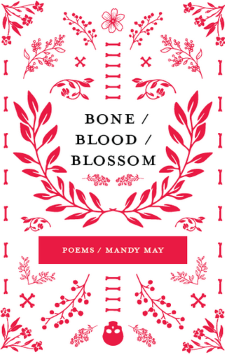New collections to make life more lyrical.

Bone / Blood / Blossom (Mason Jar Press) is an ambitious debut poetry collection by Mandy May, and sadly, the only one we will ever receive from this poet. Published a year-and-a-half after May passed away unexpectedly at the age of 36, this book moves like “a grimoire and a chronicle of chronic illness,” in the words of Dora Malech, who blurbed it.
Always, there is fidelity to the euphony and euphoria of sound in these 77 poems — a number that invokes John Berryman. May’s voice is emphatic and often funny, her forms are varied but also defined, and her poems seek a kind of verve of spirit, such as in “On a Seasonless Feeling”:
“…I shed what I can
crossing three trees and their rouge
scaffolding.
They bear it. I break.”
May was near completion of a doctorate in Information and Interaction Design when she passed, and readers will be able to see her multidisciplinary, nigh Renaissance-like depth and breadth of interests in Bone / Blood / Blossom. Certain images and themes do recur frequently — death, particular plants, the moon, spell-craft, transformation — but the poet approaches them differently depending on the poem.
Many of the poems use in their titles the orthographic slash to disrupt and sometimes join a series of words, with the book itself taking its title from one such poem. One might read this in the tradition of Dickinson — though they’re more spatial “slant” than Dickinson’s famous dashes — but also in conversation with Etheridge Knight, who often used that technique within the lines, as May does. Tracy Dimond, a Baltimore-based poet, contemporary, and friend of May, also explores this in poems’ titles.
I speculate that while these slashes could certainly suggest confinement, as in a chronically ill body, or fragmentation, as in the disruption of certitude, I am inclined to think May’s use of the slash is a nod to the greater Baltimore community that supported these poems; a way of saying one is always with and apart from one’s community. (Well, that and the opportunity to design the “look” of poems on a page in a differentiating way.)
May’s range of topics is never far from desire. Some poems hint at the erotic refracted through the natural world, while others state plainly what the poet wants. For example, in “I Want People to Think,” May writes, “I want people to think of the body’s resilient failure, rising from bedspreads of ash screaming ‘I eat men like air’ and then I did,” and then continues the anaphora to the end with, “I want people to believe that I got at least one thing right.”
The book can move quickly from lines like those to ones with a vastly different tone but still shot through with desire, such as here, from “Invitation of the Sky”:
“So I bring the onion skin of my hands to be read
the feathers of my fingers spread, and she says: Swallowthe moon, so I spring forth in flora: my mouth agape
to agate and amethyst, my throat of stars and black matter”
In reading these poems, I am continually confronted by the difficult responsibilities of being in a body and being in a community. May’s education and literary community overlap heavily with mine — we are both University of Baltimore MFA graduates and Baltimore-based writers — but I’d never encountered more than a handful of her poems. And underneath that admission is a lament that the powerful, simple, kind phrase, “I enjoyed your poems,” can never again be shared directly with this author.
I am also tenderhearted toward the delicate efficacy of introducing readers to a writer they’ll never get to know in person. If one was not already famous — whatever that might mean in the poetry world — it is easy to be overlooked in death. When we lose a poet, we lose what that poet might have done to language, and in Bone / Blood / Blossom, the promise of a bright literary career is omnipresent. May’s pathos is tempered by a sharp wit. There is a recognition that the reader’s first pleasure is not sense but sound. The poems insist, announce, slip deep, and transcend, all while maintaining their humanity. Consider this section from the title poem, which ends the book:
“If a titmouse nests in the belly of cannon, will the tissue in my womb grow back? My ovaries rattle their cysts like jewelry in the theatre rafters, mocking my heavy hip limp. Let me be your henchmen, Lilith. Let me archive your night”
Perhaps we could read the quote above as a metaphor for how to approach posthumous work. Perhaps Mandy May has provided a way to “archive your night” without turning despondent. Perhaps we could all use a little spell-making via this voice we might not otherwise have heard.
Steven Leyva’s poetry collection is The Understudy’s Handbook.